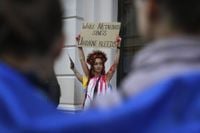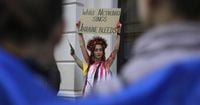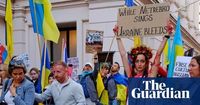On a crisp evening in London, the grand façade of the Royal Opera House was the backdrop for a scene that had little to do with music and everything to do with protest. On September 11, 2025, about 50 demonstrators—many of them Ukrainians and their supporters—gathered outside the iconic Covent Garden venue, their voices raised not in song but in pointed dissent. The focus of their ire: the celebrated Russian soprano Anna Netrebko, who was performing on the opening night of Giacomo Puccini’s “Tosca.”
Protesters waved Ukrainian flags and held up signs bearing stark messages such as “While Netrebko sings, Ukraine bleeds,” “Stop glorifying Russian aggressor culture,” and “Behind the curtain, blood and tanks.” The demonstration, as reported by The Associated Press and The Guardian, was a vivid reminder that even the world of high art is not immune to the tremors of geopolitics.
Netrebko, 53, is no stranger to controversy. Once dubbed “Putin’s diva” in the British press, she is one of the most renowned sopranos on the global stage, regularly filling opera houses from Vienna to New York. Yet her career has been shadowed by her connections to Russia’s president, Vladimir Putin, who awarded her the title of People’s Artist in 2008. Since Russia’s full-scale invasion of Ukraine in 2022, however, Netrebko has not performed in her homeland—a fact her defenders say is evidence of her distance from the Kremlin.
Still, for many in the crowd outside the Royal Opera House, that distance was not nearly enough. Natalia Filatova, a 48-year-old Ukrainian who has lived in London for more than two decades, told The Guardian, “I used to love the Royal Opera House and everything that they did but the decision is a disgrace. There are so many great opera singers, it doesn’t have to be a question. I think it’s a disgrace. I think it has damaged the image of the Royal Opera. I don’t understand how [this] theatre can be a royal theatre when this country has been supporting Ukraine since day one.”
Oleksandra Vietrova, another protester, stood with a sign reading “Behind the curtain, blood and tanks.” She explained her presence simply: “Unfortunately, all the polite communication didn’t bring any results.”
The demonstration ended with a solemn tribute to Ukraine. Protesters lit yellow candles and joined together in a stirring rendition of the Ukrainian national anthem, “Shche ne vmerla Ukrainy.”
The controversy swirling around Netrebko is not new. In the immediate aftermath of Russia’s invasion of Ukraine, she was dropped by most major opera houses, including New York’s Metropolitan Opera. Despite issuing a statement unequivocally condemning the war, she found herself ostracized by much of the Western classical music establishment. According to The Associated Press, Netrebko is currently suing the Met, alleging discrimination on the basis of gender and national origin.
Yet Netrebko has not disappeared from the stage. She made her first U.S. appearance in six years at a Palm Beach Opera recital in February 2025, and continues to perform at leading venues across Europe. The Royal Opera House engagement marked her first performance with the company since 2019, but it’s not her last: she is scheduled to return in December for a production of Puccini’s “Turandot” and is slated to give a recital in June 2026.
Her general manager, Miguel Esteban, has insisted that Netrebko “never showed support for Russian separatists” and has condemned the war in three social media statements and two interviews. He also emphasized that she has not returned to Russia since the full-scale invasion began in 2022. Still, her critics point to a 2014 incident in which Netrebko donated to Donetsk’s opera house after Russia seized the city and was photographed holding the separatist flag of “Novorossiya” alongside a pro-Kremlin former Ukrainian politician. Netrebko later said she did not understand the flag’s meaning and has since stated, “I acknowledge and regret that past actions or statements of mine could have been misinterpreted,” adding that she has only met Putin “a handful of times.”
The debate over Netrebko’s presence in London was stoked further last month when more than 50 Ukrainian writers and artists, a cross-party group of UK Members of Parliament, and former New Zealand Prime Minister Helen Clark urged the Royal Ballet and Opera to drop her from the season. In a letter, the group described Netrebko as a “longtime symbol of cultural propaganda for a regime that is responsible for serious war crimes.” They argued that the Royal Ballet and Opera faced a “defining choice: between status and responsibility, between profit and values, between silence and conscience,” and urged the institution to “remain, as you consistently have, on the ethical side of art – and of history.”
The Royal Opera House, for its part, has tried to walk a careful line. It describes itself as a “singer’s house,” with a duty to showcase the world’s greatest performers. The company has also noted that Netrebko has condemned the invasion of Ukraine. Nonetheless, the optics of her appearance have clearly struck a nerve, prompting debate not just among protesters but within the institution itself.
This is not the only recent instance of the Royal Opera House grappling with the intersection of politics and performance. Earlier in September, the company scrapped plans for a run of “Tosca” at the Israeli Opera in Tel Aviv after nearly 200 staff and performers objected, citing Israel’s conduct in the ongoing war in Gaza. The move echoed the internal divisions now playing out over Netrebko’s engagement in London.
The controversy raises thorny questions for the arts world. Should artists be held accountable for their associations, however tenuous, with political leaders or regimes? Where does the line fall between art and propaganda? And can music remain a sanctuary from politics when the world outside is so deeply divided?
For now, Anna Netrebko continues to sing—and to draw both adulation and protest in almost equal measure. The Royal Opera House, meanwhile, finds itself at the crossroads of culture and conscience, as audiences and artists alike grapple with the role of art in a world riven by war and moral uncertainty.
Outside, as the last notes of Puccini’s score faded into the London night, the candles flickered and the Ukrainian anthem lingered—a quiet, determined reminder that the world’s stages are never far from the world’s conflicts.



